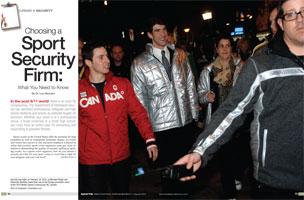
In the post 9/11 world, there is no room for complacency. The Department of Homeland Security has identified professional, collegiate and high school stadiums and arenas as potential targets for terrorism. Whether your event is at a professional venue, a large university or a small high school, you must have an action plan for preventing and responding to possible threats.
Sports events in the United States offer the potential for high casualties as well as widespread economic impact. As events and venues have grown in size and more emphasis is placed on safety and security, sports event organizers must pay close attention to determining the quality of security staffing at sporting events. As a sports event organizer, how do you choose a security provider for your sport venue or event that is right for your program and your risk level?
The case study below could happen in your program!
 |
| Photo © Studio3610 - Dreamstime.com |
USA University hired ABC Security Company to manage their complete athletic department event security. The athletic department is classified as a NCAA Division I institution with a football stadium capacity of 76,000, basketball facility holding 19,000, and baseball stadium with a capacity of 7,000. As part of their contract with the university, the security company was responsible for the management, training and evaluation of the security operations. During the third year of the three year contract, the athletic department staff noticed a change in the preparation and operation of the game day security resulting in major concern for the athletic director. Spectators began to complain to the athletic department about the inconsistency at gate security, the staff began to notice a large turnover in security personnel, particularly at the management level, and inconsistency in handling crowd control issues. There were three home football games remaining as well as the entire basketball and baseball season. In the past, the athletic department did not attend the security training sessions or review the credentials of the selected staff. The athletic director has to make a critical security decision with three football games remaining plus the remainder of the athletic events for the year.
The lesson learned from this experience is the lack of an audit of performance criteria in the contract as well as not developing a strong partnership with the out-sourced security firm. In order to forestall situations like this, it is critical to determine the type of sport security that will meet your security needs. There are several options to select in providing security staffing at sporting events. A movement taking place in the industry is the selection of private security companies to perform several functions that include: game day event security, guest services, crowd management and other security-related duties. Another strategy is the combination of in-house and private security. This strategy is used by sport venues that have year round programming. They have an in-house staff year-round, which they supplement with private firms during the busier seasons or specific events. The other security strategy is developing your own in-house security staff. Once the organization determines its security strategy, a selection process should be determined.
Security Workforce
The first priority for the sports event organizer is the security workforce. The threat and risk assessment should have determined the proper number of security workforce. Prior to selecting your event security staffing, the following guidelines are critical in determining your method of selection. When selecting a firm or in-house staffing, it is important that the security staff is properly screened, trained and equipped. In addition, the organizations should ensure the proper training procedures that will include awareness and response procedures.
It is important to emphasize training as a critical step for a successful event. In preparation of the selection, it is important to assure that specific areas of security training are offered: Incident Command System (ICS); Unified Command (UC); specialized equipment; orientation of security plans; legal issues; tactics for crowd control; use of personal protective equipments; and recognizing signs of possible terrorist activities. Prior to the final selection, the following training aspects should be discussed with bidders:
Ensure a comprehensive training needs assessment be conducted to identify all skills needed to implement the event security plan.
Ensure the most effective and efficient training methods are available.
Ensure there are sufficient training resources particularly technology applications.
Selecting Your Sport Security Firm
Regardless of the type of sport security system you choose, the selection process and criteria are very important. Once the security system is chosen, the search begins for a security corporation that will work with your organization and become a true partner and not just provide a service. The process begins with selection of a search team made up of principle security shareholders who can assist in the establishment of a security philosophy as well as prioritizing the organization's security needs. A comprehensive assessment should be conducted to identify training needs along with physical protective measures and development of a security budget. Other considerations for the selection committee should be selecting a firm that specializes in sport security, strong management infrastructure, outstanding training program, record of low turnover, and past experience with partnership arrangements.
Once the search team has established a security philosophy and prioritized the security needs, it should review the specific areas of emphasis needed for the development of the RFP (request for proposal). Particular interest should be paid to employee training, employee turnover rates, customer service, insurance and technology applications. Another key point is the contract's allowance for canceling the security service without penalty and having the right to audit the contractor's performance at any time.
Identify potential security providers which should be evaluated not only based upon their services but also on their presence in the local market and/or sports markets in which they have expertise. Reference checks should be emphasized. Does the company have other similar clients in the sports market? What type of experience and reputation do they have with local emergency responders, local, state and federal agencies? Do they have regular meetings with those agencies? Have the organization's management infrastructure and its security procedures been vetted?
Make sure the prospective firm is compliant with state licensure. Consider the level of insurance and liability the security firm takes on and understand the limitations of those protections. One important recommendation is for the search committee to attend one of their events and witness their security operations and customer service.
At this point, the selection committee is prepared to create an RFP. The proposal should be centered on security personnel requirements and needs, requested services, performance requirements and insurance coverage. Based on the needs, wants and improvement areas, the committee will develop a security budget that meets their requirements. The committee should select at least three contractors that meet the proposed criteria. This is followed with interviews. During the interviews, it is important to get the opportunity to better understand their security philosophy and determine if they are able to partner with your organization.
During the visit, it is important to better understand how they manage personnel. What type of background checks and screenings are done? Does it meet or exceed state requirements for drug screening? Ask about the turnover rate and what type and level of benefits they offer.
How extensive and frequently are training and continuing education provided to their individual staff members and what specialized training do members of their staff receive?
Perhaps most importantly, evaluate the security management staff and their management qualifications. Ultimately, a key decider is the potential of a partnership with whom the organization can build a long term relationship and a trusting atmosphere.
As we look back on the case study, if a strong partnership had been built between the two organizations and they had established trust, accountability and communication, the situation might have been prevented.

